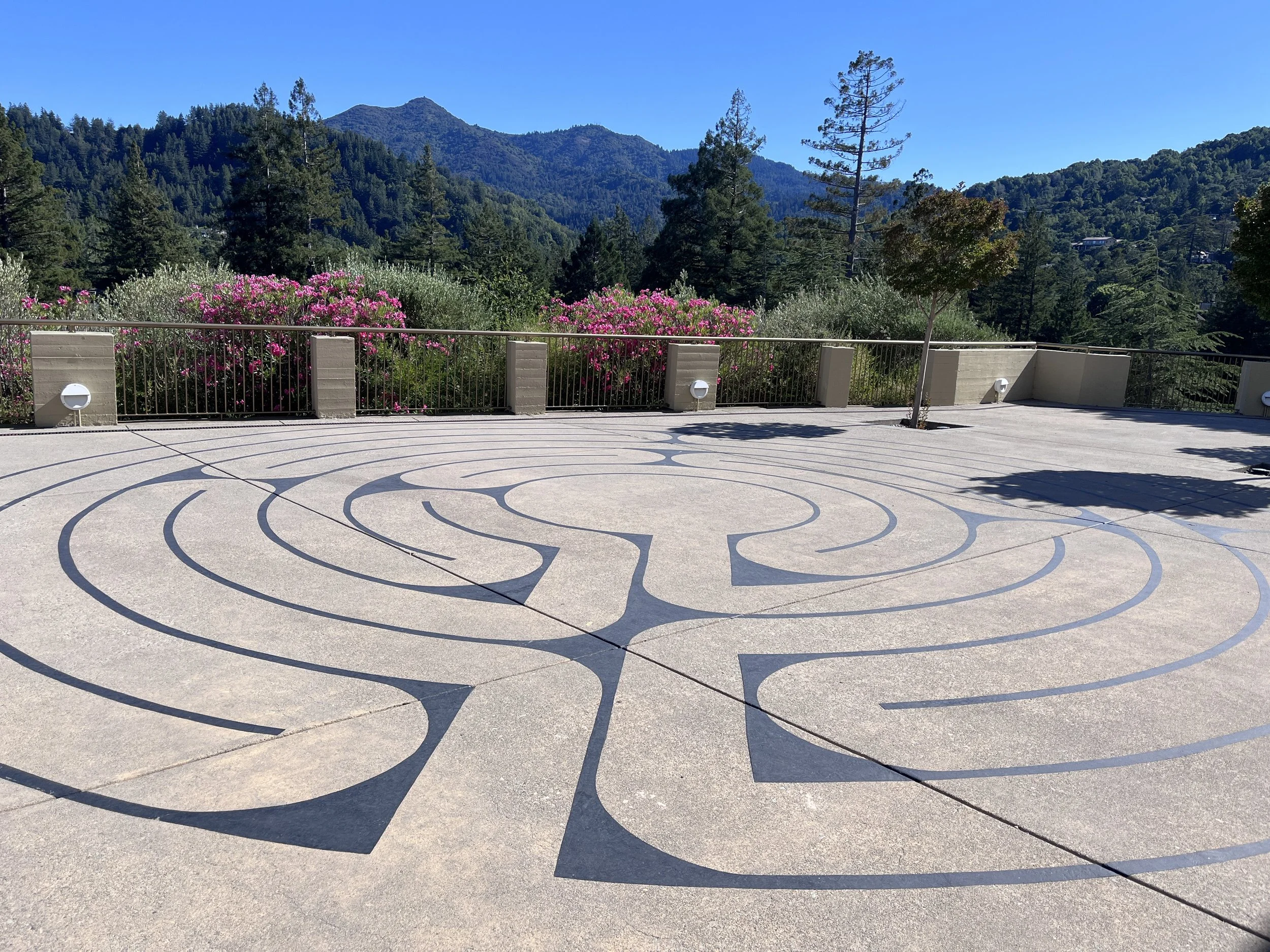What healing taught me about letting go
October 13, 2025
Labyrinth at the University of Redlands in San Anselmo, CA
Cancer recovery is humbling.
In late 2023, I was diagnosed with lung cancer. After surgery, thankfully, so far, I’m cancer-free. I previously wrote about my experience with the diagnosis and surgery. This is the first in a series where I’m focused on my recovery.
. . . . .
When I was first diagnosed, an elderly family member told me about her uncle who didn’t get out of pajamas for a year after getting a cancer diagnosis, thinking he was going to die anyway. At the time I told her not to worry, there was no way I would do that.
Right after surgery, I was hyper-focused on increasing endurance and capability, thinking if I didn’t go all out I’d miss some opportunity to get back to my new maximum capacity, whatever that would be. Absent any other markers, I actually believed I’d be “recovered” when I could do triangle pose and walk up hills unencumbered. My surgeon had told me “most people are doing most of their activities in 4-6 weeks” so I dutifully followed all his team’s instructions. I took care to avoid any complications after the surgery. I walked as much as I could. I did breathing exercises. I went to the gym and started walking on the treadmill. I hired a trainer to help me increase my endurance by using free weights. I was a good student and did what I was told. All the medical staff all told me my recovery was “remarkable,” by which they meant that, thanks to decades of yoga practice, the remaining lobes of my lungs had hyperinflated to fill my chest cavity. On scans they couldn’t even tell I’d had a lobe removed.
I quickly discovered that surgeons are notoriously optimistic. Despite my great lung capacity, in 6 weeks I could barely make the bed or carry a one-year old for 10 minutes, and I could not spend more than an hour in meetings or I’d run out of breath. I tried to do triangle pose, and although I could approximate the position, I couldn’t sustain it muscularly, and definitely couldn’t breathe there. I thought I was failing, doing something wrong. I kept asking the surgeon’s staff what I could do differently.
My primary care provider, massage therapist, and chiropractor were instrumental in helping me understand that it was going to take much longer, that my recovery was indeed remarkable, but it was still going to take probably 1-2 years to get whatever capability I’d eventually regain.
I started to realize I’d been trying to take control of my recovery because I had no control over the cancer.
Cut to 8 months after surgery. My first cold and flu season with my new lung setup kicked my butt. I was more prone to viruses, my previously mild asthma needed to be managed more closely, and I needed to work on overall lung health beyond breath capacity. I needed to be much more cautious in terms of the activities I did, and had to wear a mask around friends and family. This was territory I did not expect to encounter and I did not like it. The cancer was no longer the threat but having a cold that kept me from seeing family and friends Thanksgiving week, missing my meditation group’s holiday dinner, and having to cancel other social plans was unexpected and a lot more disturbing than having to pause a moment while walking uphill. My goal for the holiday season was to do all the things I couldn’t do the prior year and it was frustrating that I wasn't able to.
“I started to realize I’d been trying to take control of my recovery because I had no control over the cancer.”
There were days when I just felt like hunching over and sitting slumped in a chair. For the first time in my life, I understood why people park themselves on the couch and don’t get up because the amount of effort required to regain capability is so great. I could have easily become my family member’s uncle.
I was grateful to have excellent emotional support. I’m fortunate to have an incredible group of friends, family, professional colleagues, and medical practitioners. I don’t know how people manage recovery from a serious illness without a strong network of support.
I was starting to realize recovery is a process, not an outcome, and it has nothing to do with triangle or any other yoga pose. Nothing is promised. The hardest lesson I continue to learn is to be okay with uncertainty, to stay curious, and be open whatever the circumstances.
I started reading Suleika Jaouad’s Between Two Kingdoms. I knew the gist of her story - she went through a very rough 3-year battle with leukemia starting at 22. I didn’t think her story applied to me because her cancer was so much worse than mine. I had what one of her friends in the book calls “Cancer Lite” where you only need surgery. But even Cancer Lite messes with your mind. She’s able to put words to what I’ve discovered.
Recovery isn’t a gentle self-care spree that restores you to a pre-illness state. Though the word may suggest otherwise, recovery is not about salvaging the old at all. It’s about accepting that you must forsake a familiar self forever, in favor of one that is being newly born. It is an act of brute, terrifying discovery. (page 234)
For me, the “brute terrifying discovery” led me to rethink my entire self-image. More on that to come in the next installment.
. . . . .
Thanks so much to Kimra McPherson for her incredible thought partnership in shaping not only this story but the entire series.

